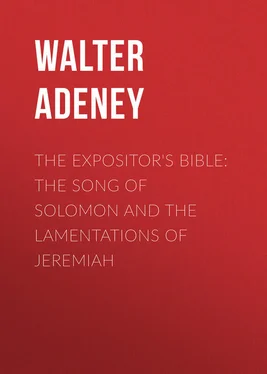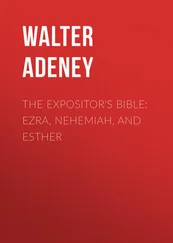Walter Adeney - The Expositor's Bible - The Song of Solomon and the Lamentations of Jeremiah
Здесь есть возможность читать онлайн «Walter Adeney - The Expositor's Bible - The Song of Solomon and the Lamentations of Jeremiah» — ознакомительный отрывок электронной книги совершенно бесплатно, а после прочтения отрывка купить полную версию. В некоторых случаях можно слушать аудио, скачать через торрент в формате fb2 и присутствует краткое содержание. Издательство: Иностранный паблик, Жанр: foreign_religion, foreign_antique, foreign_prose, на английском языке. Описание произведения, (предисловие) а так же отзывы посетителей доступны на портале библиотеки ЛибКат.
- Название:The Expositor's Bible: The Song of Solomon and the Lamentations of Jeremiah
- Автор:
- Издательство:Иностранный паблик
- Жанр:
- Год:неизвестен
- ISBN:нет данных
- Рейтинг книги:3 / 5. Голосов: 1
-
Избранное:Добавить в избранное
- Отзывы:
-
Ваша оценка:
- 60
- 1
- 2
- 3
- 4
- 5
The Expositor's Bible: The Song of Solomon and the Lamentations of Jeremiah: краткое содержание, описание и аннотация
Предлагаем к чтению аннотацию, описание, краткое содержание или предисловие (зависит от того, что написал сам автор книги «The Expositor's Bible: The Song of Solomon and the Lamentations of Jeremiah»). Если вы не нашли необходимую информацию о книге — напишите в комментариях, мы постараемся отыскать её.
The Expositor's Bible: The Song of Solomon and the Lamentations of Jeremiah — читать онлайн ознакомительный отрывок
Ниже представлен текст книги, разбитый по страницам. Система сохранения места последней прочитанной страницы, позволяет с удобством читать онлайн бесплатно книгу «The Expositor's Bible: The Song of Solomon and the Lamentations of Jeremiah», без необходимости каждый раз заново искать на чём Вы остановились. Поставьте закладку, и сможете в любой момент перейти на страницу, на которой закончили чтение.
Интервал:
Закладка:
Clearly Solomon has made a clumsy move. This shy bird is not of the common species with which he is familiar. He must aim higher if he would bring down his quarry. She is not to be classed with the wares of the matrimonial market that are only waiting to be assigned to the richest bidder. She cannot be bought even by the wealth of a king's treasury. But if there is a woman who can resist the charms of finery, is there one who can stand against the admiration of her personal beauty? A man of Solomon's experience would scarcely believe that such was to be found. Nevertheless now the sex he estimates too lightly is to be vindicated, while the king himself is to be taught a wholesome lesson. He may call her fair; he may praise her dove-like eyes. 24 24 i. 15.
His flattery is lost upon her. She only thinks of the beauty of her shepherd lad, and pictures to herself the green bank on which they used to sit, with the cedars and firs for the beams and roof of their trysting-place. 25 25 i. 16, 17.
Her language carries us away from the gilded splendour and close, perfumed atmosphere of the royal palace to scenes such as Shakespeare presents in the forest of Arden and the haunts of Titania, and Milton in the Mask of Comus . Here is a Hebrew lady longing to escape from the clutches of one who for all his glory is not without some of the offensive traits of the monster Comus. She thinks of herself as a wild flower, like the crocus that grows on the plains of Sharon or the lily (literally the anemone) that is sprinkled so freely over the upland valleys. 26 26 ii. 1.
The open country is the natural habitat of such a plant, not the stifling court. Solomon catches at her beautiful imagery. Compared with other maidens she is like a lily among thorns. 27 27 ii. 2.
And now these scenes of nature carry the persecuted girl away in a sort of reverie. If she is like the tender flower, her lover resembles the apple tree at the foot of which it nestles, a tree the shadow of which is delightful and its fruit sweet. 28 28 ii. 3.
She remembers how he brought her to his banqueting house; that rustic bower was a very different place from the grand divan on which she had seen Solomon sitting at his table. No purple hangings like those of the king's palace there screened her from the sun. The only banner her shepherd could spread over her was love, his own love. 29 29 ii. 4.
But what could be a more perfect shelter?
She is fainting. How she longs for her lover to comfort her! She has just compared him to an apple tree; now the refreshment she hungers for is the fruit of this tree; that is to say, his love. 30 30 ii. 5.
Oh that he would put his arms round her and support her, as in the old happy days before she had been snatched away from him! 31 31 ii. 6.
Next follows a verse which is repeated later, and so serves as a sort of refrain. 32 32 ii. 7.
The Shulammite adjures the daughters of Jerusalem not to awaken love. This verse is misrendered in the Authorised Version, which inserts the pronoun "my" before "love" without any warrant in the Hebrew text. The poor girl has spoken of apples. But the court ladies must not misunderstand her. She wants none of their love apples, 33 33 See Gen. xxx. 14.
no philtre, no charm to turn her affections away from her shepherd lover and pervert them to the importunate royal suitor. The opening words of the poem which celebrated the charms of Solomon had been aimed in that direction. The motive of the work seems to be the Shulammite's resistance to various attempts to move her from loyalty to her true love. It is natural, therefore, that an appeal to desist from all such attempts should come out emphatically.
The poem takes a new turn. In imagination the Shulammite hears the voice of her beloved. She pictures him standing at the foot of the lofty rock on which the harem is built, and crying, —
"Oh, my dove, that art in the clefts of the rock, in the cover of the steep place,
Let me see thy countenance, let me hear thy voice;
For sweet is thy voice, and thy countenance is comely." 34 34 ii. 14.
He is like a troubadour singing to his imprisoned lady-love; and she, in her soliloquys, though not by any means a "high-born maiden," may call to mind the simile in Shelley's Skylark : —
"Like a high-born maiden
In a palace tower,
Soothing her love-laden
Soul in secret hour,
With music sweet as love, which overflows her bower."
She remembers how her lover had come to her bounding over the hills "like a roe or a young hart," 35 35 ii. 9.
and peeping in at her lattice; and she repeats the song with which he had called her out – one of the sweetest songs of spring that ever was sung. 36 36 ii. 11-13.
In our own green island we acknowledge that this is the most beautiful season of all the round year; but in Palestine it stands out in more strongly pronounced contrast to the three other seasons, and it is in itself exceedingly lovely. While summer and autumn are there parched with drought, barren and desolate, and while winter is often dreary with snow-storms and floods of rain, in spring the whole land is one lovely garden, ablaze with richest hues, hill and dale, wilderness and farmland vying in the luxuriance of their wild flowers, from the red anemone that fires the steep sides of the mountains to the purple and white cyclamen that nestles among the rocks at their feet. Much of the beauty of this poem is found in the fact that it is pervaded by the spirit of an eastern spring. This makes it possible to introduce a wealth of beautiful imagery which would not have been appropriate if any other season had been chosen. Even more lovely in March than England is in May, Palestine comes nearest to the appearance of our country in the former month; so that this poem, that is so completely bathed in the atmosphere of early spring, calls up echoes of the exquisite English garden pictures in Shelley's Sensitive Plant and Tennyson's Maud . But it is not only beauty of imagery that our poet gains by setting his work in this lovely season. His ideas are all in harmony with the period of the year he describes so charmingly. It is the time of youth and hope, of joy and love – especially of love, for,
"In the spring a young man's fancy
Lightly turns to thoughts of love."
There is even a deeper association between the ideas of the poem and the season in which it is set. None of the freshness of spring is to be found about Solomon and his harem, but it is all present in the Shulammite and her shepherd; and spring scenes and thoughts powerfully aid the motive of the poem in accentuating the contrast between the tawdry magnificence of the court and the pure, simple beauty of the country life to which the heroine of the poem clings so faithfully.
The Shulammite answers her lover in an old ditty about "the little foxes that spoil the vineyards." 37 37 ii. 15.
He would recognise that, and so discover her presence. We are reminded of the legend of Richard's page finding his master by singing a familiar ballad outside the walls of the castle in the Tyrol where the captive crusader was imprisoned. This is all imaginary. And yet the faithful girl knows in her heart that her beloved is hers and that she is his, although in sober reality he is now feeding his flocks in the far-off flowery fields of her old home. 38 38 ii. 16.
There he must remain till the cool of the evening, till the shadows melt into the darkness of night, when she would fain he returned to her, coming over the rugged mountains "like a roe or a young hart." 39 39 ii. 17.
Интервал:
Закладка:
Похожие книги на «The Expositor's Bible: The Song of Solomon and the Lamentations of Jeremiah»
Представляем Вашему вниманию похожие книги на «The Expositor's Bible: The Song of Solomon and the Lamentations of Jeremiah» списком для выбора. Мы отобрали схожую по названию и смыслу литературу в надежде предоставить читателям больше вариантов отыскать новые, интересные, ещё непрочитанные произведения.
Обсуждение, отзывы о книге «The Expositor's Bible: The Song of Solomon and the Lamentations of Jeremiah» и просто собственные мнения читателей. Оставьте ваши комментарии, напишите, что Вы думаете о произведении, его смысле или главных героях. Укажите что конкретно понравилось, а что нет, и почему Вы так считаете.












